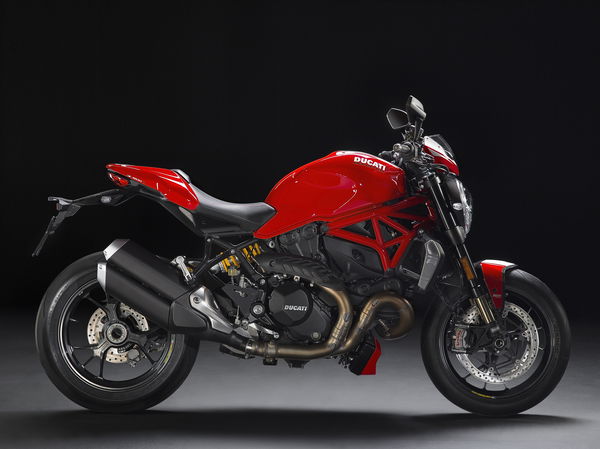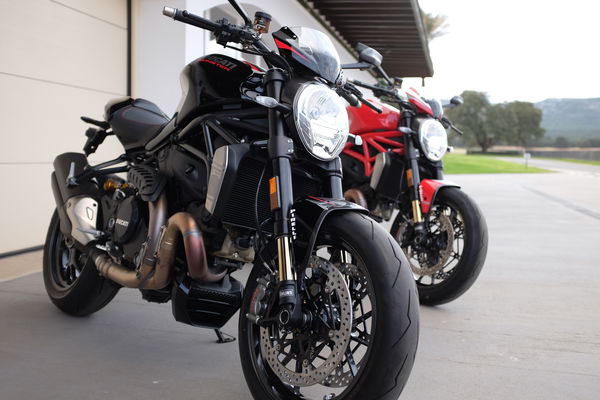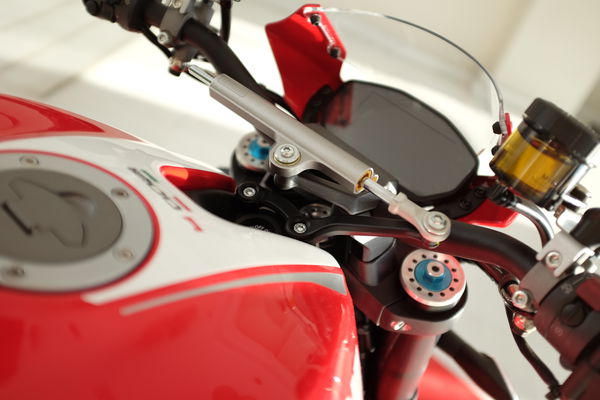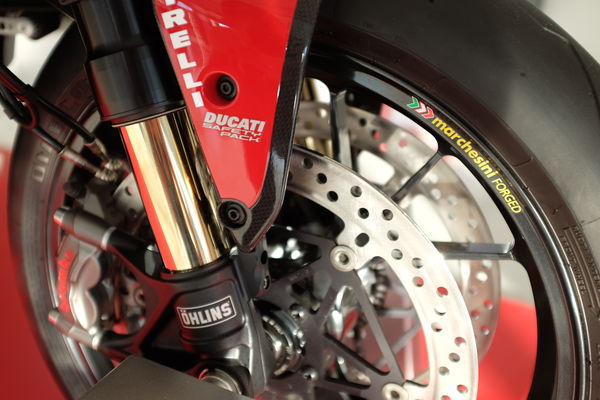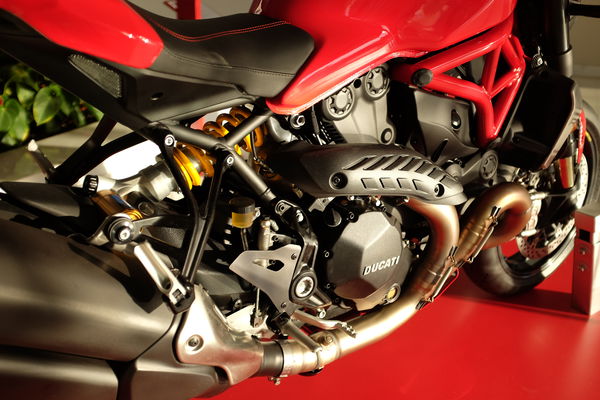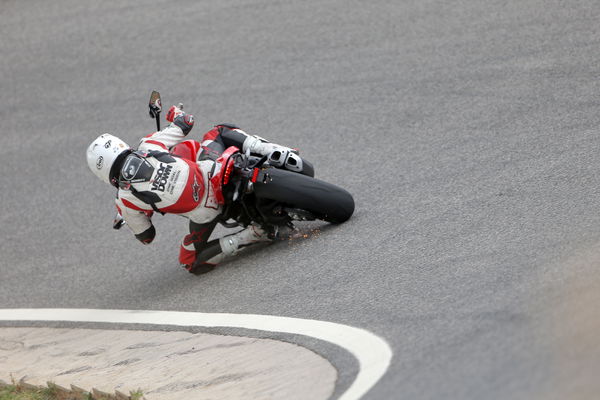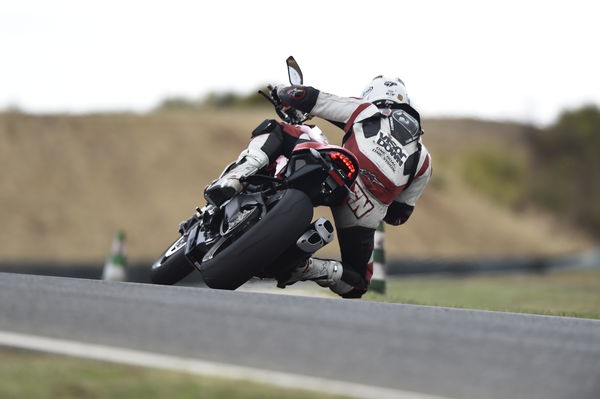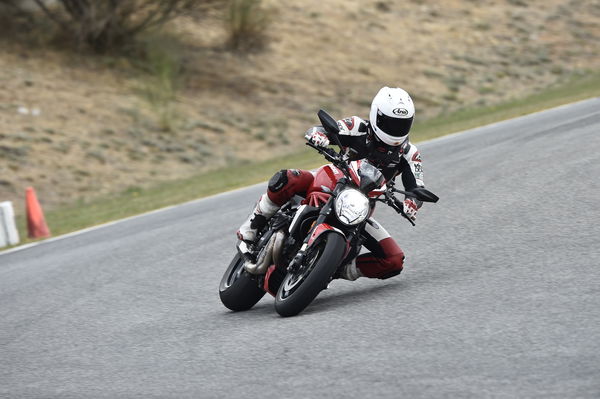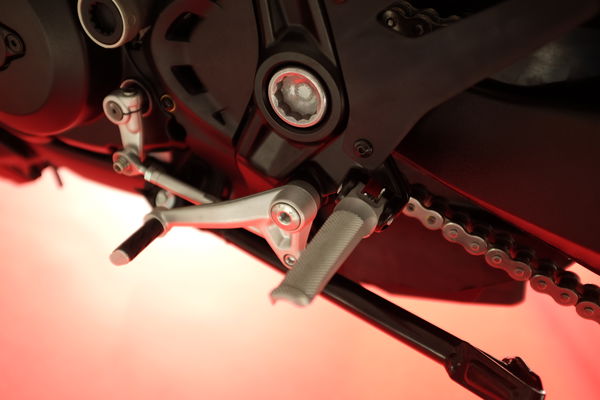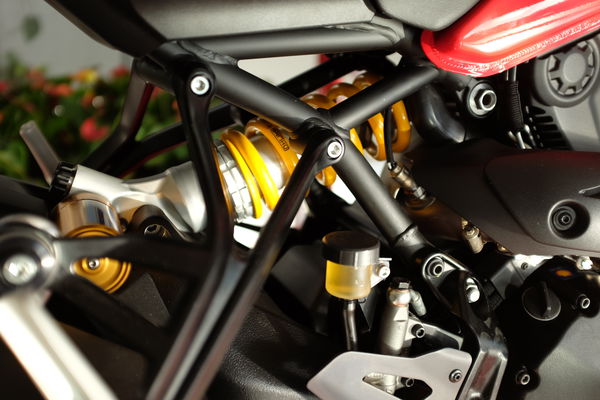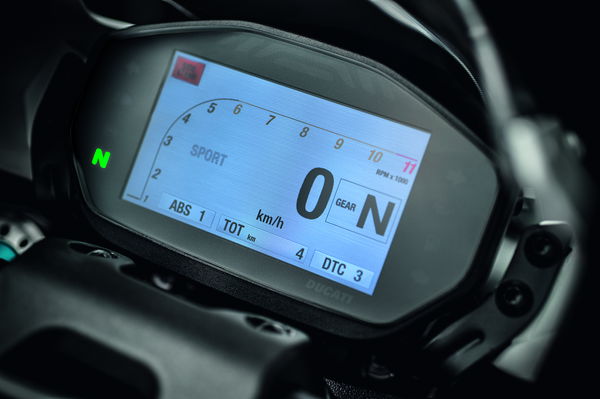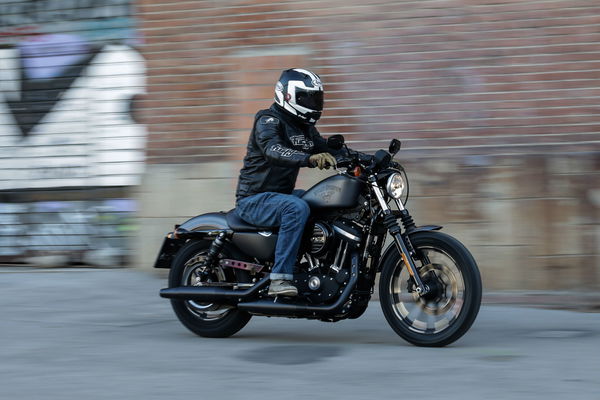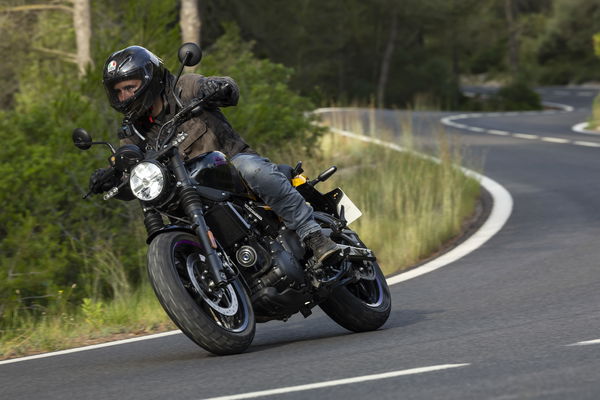Ducati Monster 1200R review
The Ducati Monster 1200R is a special kind of beast, an uber-indulgent track bike that offers great performance but is not as competitively priced as its rivals from KTM and Triumph.
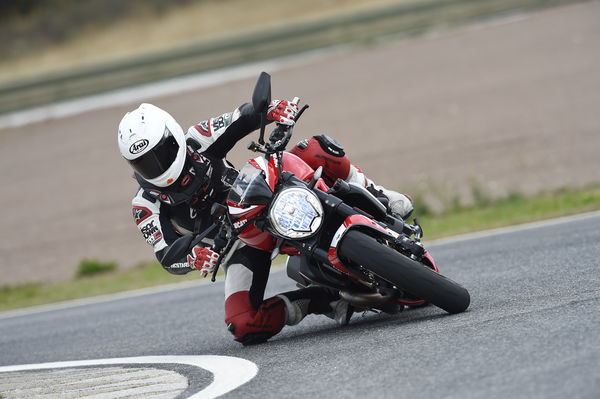
Ducati Monster 1200R (2016): Design
Now and then, Ducati produces a very special Monster and right now, that Monster is the 1200R.
Even though this Monster is the ‘sportiest’ one yet, it still feels strange being at the Ascari circuit for the launch of the 1200R. It feels like you’re about to watch a rugby player attempting the Foxtrot on Strictly Come Dancing.
I always think of a Monster as an earthy Ducati; less about status or lap times and more suited to people who want to go from A to B on something that's got more character than the traditional four-cylinder rivals.
The Monster 1200R takes over from the S as the ultimate incarnation of the Monster range. If you laid out all the component parts of a Monster 1200S and 1200R, you’d probably find that 97% are the same, but the few that have been changed are significant enough to – on paper at least - elevate the 1200R into the ‘track-weapon’ league.
The predictable headline is ‘Power Up By 15bhp. Weight Down by 2kg. Read all about it!’ but the other changes are rather more interesting and reveal a little more insight into Ducati’s development process
The wheels are lightweight forged alloy. The rear sub-frame is an all-new slimmer and lighter aluminium unit, with slimmer tail piece. The one-piece rider and pillion foot-pegs have been replaced with machined rider’s footpegs (and very nice they are too) and removable pillion pegs. The S’s Pirelli Diablo Rosso II tyres have been replaced with 200/55 profile Pirelli Diablo Supercorsa SP tyres, the exact ones you’ll find on the 1299 Panigale. For the first time on a Monster there’s a steering damper fitted. Made by Öhlins, as if you needed to ask.
The R’s black forks look different to the gold ones on the S but the suspension is essentially the same; fully-adjustable Öhlins front and rear. However on the R, the forks are slightly longer and the rear shock length has been increased too, meaning that the seat height now sits at 830mm, as opposed to 810mm on the Monster 1200S. The tweaked geometry set-up also shortens the wheel-base by 2mm, from 1511mm to 1509mm and while the rake stays the same, there’s less trail: 89mm instead of 93mm on the S.
The additional power is down to the revised air-box, larger throttle bodies, new pistons - which hike compression from 12.5:1 to 13:1 - and a larger exhaust, up from 50mm to 58mm. The exhaust pipes are a work of art and bulge from the side of the bike like the veins in a weightlifter’s neck. The exhaust cans are new, too and are some of the smartest standard I’ve seen.
While the headlines might scream power, it’s the small touches and attention to detail that make the 1200R stand out from the crowd. But that said, it’s also subtler than the 1200S, as the black forks and darker engine cases of the R make it something of a sleeper to the casual observer.
The 1200R features the same electronics package as the S: three riding modes, ABS, traction control and the same gorgeous and easy-to-use TFT display.
The 1200R - like the dancing rugby player - has been through an intensive training plan to transform it from a sledgehammer to chisel. Despite the R badge and the specification of the new Monster, I still had a feeling it would be a brutal tool rather than a sharp instrument. How wrong could I have been?
As it turns out, very.
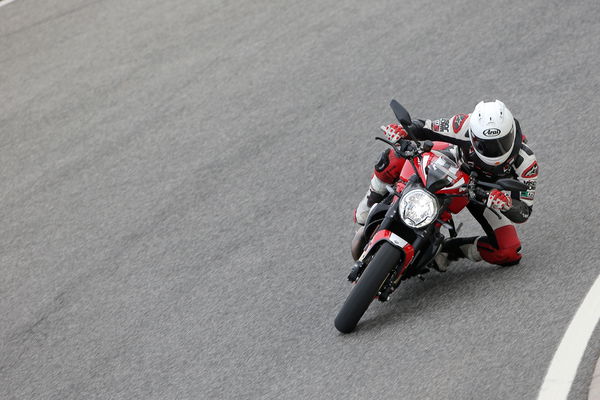
Ducati Monster 1200R (2016): Comfort
Sitting in the queue of bikes, waiting to stream out of the pit-lane, the 1200R gives out mixed messages. At 830mm, the seat height is 15mm higher than a 2015 BMW S1000RR's. It’s catch-you-out, tip-toe stuff for this just-short-of-six-foot rider and yet the bars are flat and straight in front of me. I feel like I’m sitting on a big bloody racehorse. Watching other riders bolt out of pit-lane, I’m slightly apprehensive of what I’m about to put myself through.
The bars are a reach forward rather than down. It’s upright, comfortable, roomy even. It doesn’t feel like the bum-up-wrists-down position you might associate with a fast lap or indeed any lap.
Ducati Monster 1200R (2016): Engine
My words cannot do the noise the motor makes any real justice. It sounds like a bass guitar but not any bass guitar. Imagine a bass guitar twenty times normal size. So big, you have to jump just to hang onto the bottom string. When you finally lose your grip and fall back down to the ground, the twang it makes, well, that’s close to the noise the 1198cc Testastretta motor belts out. It resonates your insides.
While the headline figure is 160hp, it’s the torque and throttle response that really stand out. Torque is up from the Monster 1200S’s 92lbft to 97lbft on the 1200R and while the engine revs harder, it doesn’t need to be thrashed.
The chassis and engine work so well together. It feels plush but poised, honed, not harsh. You can carry so much corner speed, you don’t need to rip the throttle off between turns. The motor just twangs at a different pitch as you short-shift and feed in the gears.
This alone gives a surreal edge to the track experience because there aren’t a million revs buzzing inside your helmet. The baritone engine note and comparative lack of revs removes the frantic edge you get with most sportsbikes. The 1200R tricks you into thinking you’re not really shifting, while the bike's looks will trick most people into thinking it can’t really shift.
Ducati Monster 1200R (2016): Braking and Handling
The huge Brembo M50 calipers deal with anything you can throw at them but corner entry is made simpler and later thanks to the wet slipper-clutch, which helps scrub off those last few miles an hour after you’ve peeled off the brakes. It’s the same clutch as fitted to the S.
I can remember needing two hands to operate the clutch on the S4RS, it was so heavy. However, S4RS owners fear not, you could operate the 1200R’s clutch with just the bicep you’ve developed in your little finger. It’s good that the 1200R’s clutch is light, because you need to use the clutch twice as much as you’d like since there’s no quick-shifter. Sure, we’ve managed without quick-shifters for years but I opted to hang onto a gear through the corner rather than risk a half-baked upshift.
Of course you can live without a quick-shifter but, like the dead pixel on your fancy TV, once you’ve noticed it, you can’t ignore it and you won’t rest until you’ve done something about it.
Aside from stickier tyres, a quick-shifter is about the only thing I think you could quickly add to the 1200R to make it lap faster.
Ground clearance is better than any naked bike ought to need but at the same time you wouldn’t want it any less, because the 1200R is so capable in the corners. It goads you to crank it over.
I managed to bend the gear shifter back on one particularly tight left-hander and scuff the sidestand through a few of the other turns. I say 'scuff' because I want to be clear it was little more than that (I'm conscious that a scuff can turn into a gouge and a gouge always turns into a high-side). I highly doubt you’d get anywhere near its limitations on the road but at the Ascari circuit, where tight corners are mixed with sharp changes in camber, the 1200R’s ground clearance was tested to the maximum.
The only other imperfection I can think of is that the single-sided swingarm, which lends itself to effortless tyre changes on trackdays, is hampered by the exhaust, which needs to be removed to change the rear wheel. Not in itself a difficult job, but it relegates the single-sided swingarm to objet d'art status and not a time-saving bonus.
Should I buy the Ducati Monster 1200R (2016)?
The 1200R works hard for your money but it’s up against some accomplished competition. KTM’s 1290 Super Duke R is an obvious rival in terms of performance. In terms of a package, something extra special, the Triumph Speed Triple R or newer 94R no doubt go head-to-head with Ducati in the exotica stakes.
Forget price tags for a moment and you’d have to find a really good reason to not buy the Ducati. It would give the KTM a run for its money in the performance stakes and matches its electronics package. When it comes to the Triumph, the Ducati more than matches it in terms of bling and beats it in terms of electronics. At £15,250, the 1200R is £1,250 more expensive than the KTM and £4,250 more than the Triumph.
Ducati are confident they’ll sell every 1200R they bring into the UK and that the R, at £1,700 more than the S, will outsell the S by two to one.
For trackdays and out-and-out, ‘You can’t do that on THAT’ moments, I’d go for the 1200R every time.
It's an indulgent track-ready bike. It’s just a shame most will never see a track.
Ducati Monster 1200R (2016): Specifications
- Model tested: 2016 Ducati Monster 1200R
- Power: 160hp @9,250rpm
- Torque: 97lb.ft @ 7,750rpm
- Wet weight: 207kg
- Tank capacity: 17.5 litres
- Seat height: 830mm
- Colours: Red or Black
- Available: January 2016
- Price: £15,250
